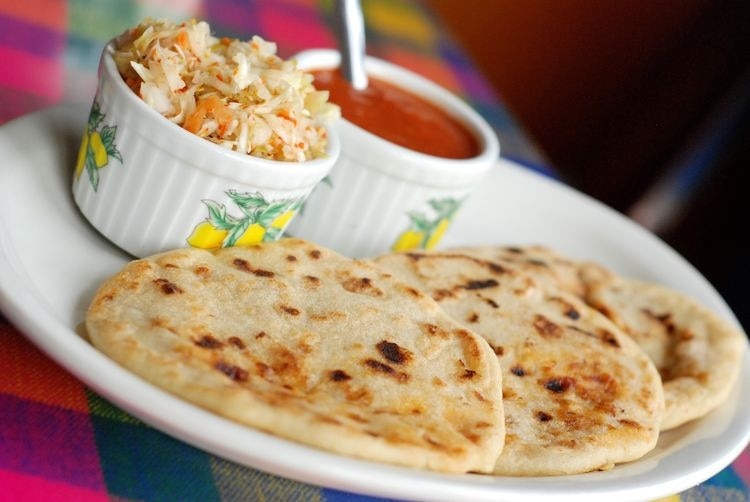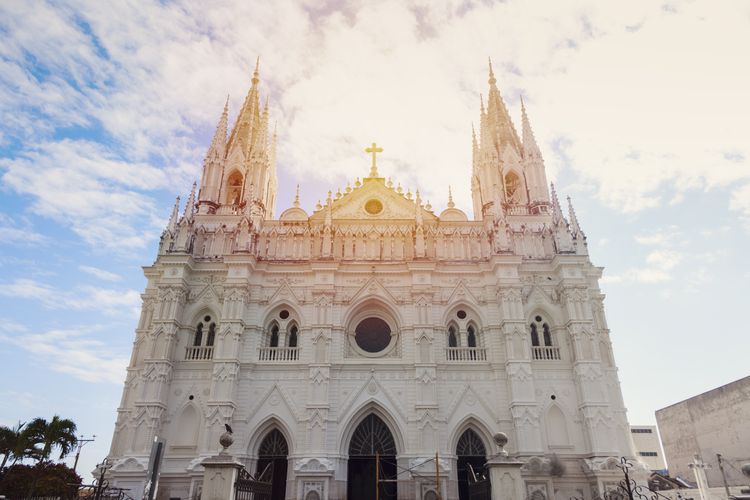-
2026/04/27
Los Angeles(LAX) -
2026/05/06
San Salvador
(Updated: June, 15, 2025 20:08)
El Salvador Travel Tips and Information
Official Name
Republic of El Salvador
Capital
San Salvador
Population
Country Code
Around 6.35 million
SV
Country Code (international calls)
+503
The flight time to El Salvador is approximately 8 hours. Check the climate, currency, religion, manners, other information of El Salvador below. Wishing you pleasant travels to El Salvador.
Located in the heart of Central America, El Salvador is a Latin American republic and the only one of the five Central American nations without a Caribbean Sea coastline.
Compare Airfares for Flights to El Salvador
Local Climate / Weather
El Salvador has a tropical climate with pronounced seasonal changes. The year is divided into two main seasons: the dry season (known locally as "verano"), which lasts from November to April, and the rainy season ("invierno"), occurring between May and October. During the dry season, expect warm temperatures and plenty of sunshine, ideal for exploring the country's natural attractions, while the rainy season brings heavy but often brief downpours, especially in the afternoons and evenings. Temperatures in El Salvador generally range between 20°C to 32°C, with cooler temperatures at higher altitudes in the mountainous regions. Seasonal Travel Advice For travelers, the best time to visit El Salvador is during the dry season, from November to April, when the weather is more predictable, and outdoor activities such as hiking and beach trips are more enjoyable. This period is particularly suited for exploring famous sights like the Ruta de Las Flores, the majestic Santa Ana Volcano, and the stunning Pacific beaches without the risk of rain disrupting your plans. However, traveling during the rainy season can have its own advantages. From May to October, the landscapes become lush and vibrant, perfect for nature lovers wanting to see El Salvador at its greenest. This is also the time when waterfalls are most impressive. Keep in mind, though, that afternoon rains can limit outdoor activities, so it's advisable to plan your excursions in the morning when the weather is typically more stable. Major Events and Festivals El Salvador's cultural calendar is filled with exciting festivals that are worth planning your visit around. In early August, the country celebrates the "Fiestas Agostinas," or August Festival, which takes place in San Salvador in honor of the Divine Savior of the World. This week-long celebration features parades, music, food, and religious processions, offering an immersive cultural experience for travelers. Another major event is the "Semana Santa" (Holy Week), celebrated during March or April, depending on the liturgical calendar. Holy Week features vibrant processions and activities across the country, making it a special time for experiencing local traditions. If you are visiting in November, you can also enjoy "Día de los Muertos" (Day of the Dead), a festival honoring loved ones that have passed, characterized by the decoration of graves and the offering of food. Whether you’re visiting El Salvador for its warm climate or to experience its rich cultural events, understanding the weather patterns can help you make the most of your journey.
Currency & Tipping
Currency
In El Salvador, the official currency is the United States Dollar (USD), widely used for transactions, making it convenient for travelers familiar with international exchanges. Major credit cards are accepted in most urban areas and tourist centers, though carrying small bills for rural areas and local markets is advisable.
Tipping
When it comes to tipping, it's customary to leave around 10% of the bill in restaurants if a service charge is not included. For hotel staff, small tips are appreciated for services like luggage assistance or room cleaning. Understanding these customs can help travelers navigate El Salvador smoothly, enhancing their travel experience.
Useful Travel Information

Voltage & Electrical Outlets
El Salvador operates on a 120V supply voltage with a frequency of 60Hz. The country primarily uses Type A and Type B electrical outlets, which accommodate flat parallel prongs. Travelers may need to bring an adapter, especially if their devices use a different plug type.

Internet Connectivity
The internet environment in El Salvador is accessible and increasingly reliable, with 4G coverage available in urban areas and growing accessibility in rural regions. Major local carriers include Claro El Salvador, Tigo El Salvador, and Movistar, which provide various data plans for tourists. These carriers offer prepaid SIM cards with packages for calls, texts, and internet access. For convenience, travelers can purchase SIM cards upon arrival or at various retail outlets in major cities.
Water for Consumption (Drinking Water)
When it comes to drinking water in El Salvador, it’s recommended to consume bottled or filtered water, as tap water may not always meet international health standards. Bottled water is widely available in supermarkets, convenience stores, and hotels, providing a safe and accessible option for hydration. Alternatively, travelers can use portable water filtration devices if they plan to explore remote areas.
Culture, Religion & Social Etiquette
Culture
El Salvador’s vibrant culture combines Indigenous heritage with Spanish influences, creating a lively mix of festivals, music, dance, and art that travelers will find fascinating. Notable traditions include annual celebrations such as Fiestas Agostinas in August and Semana Santa (Holy Week), where the country comes alive with processions, religious events, and colorful festivities. Salvadorans value family and community, which is reflected in their warm hospitality and gatherings.
Religion
Predominantly Roman Catholic, with a growing Protestant Christian community, religion in El Salvador plays a significant role in daily life. Visitors will notice that religious events, particularly around Christmas, Easter, and patron saint festivals, are celebrated widely. Travelers may appreciate the shared religious values and customs, which foster a sense of familiarity.
Social Etiquette
Salvadorans are generally friendly and polite, prioritizing respect and cordiality in social interactions. Handshakes are common for greetings, and titles or formal language are used in professional or new acquaintances. Travelers visiting El Salvador may find comfort in the shared value of showing respect to elders and maintaining close family ties. Additionally, when invited to someone’s home, it’s customary to bring a small gift as a gesture of appreciation. Awareness of these social norms will enhance the travel experience for visitors, creating a positive and respectful cultural exchange.
Food Culture
El Salvador offers a rich and flavorful food culture that blends indigenous, Spanish, and African influences, creating a unique dining experience that will intrigue travelers. The country’s cuisine is known for its hearty dishes and use of fresh, local ingredients. A staple that visitors might find particularly enticing is the pupusa, a thick corn tortilla stuffed with a variety of fillings like cheese, beans, or pork, often served with pickled cabbage called curtido. This iconic Salvadoran dish is commonly found in local markets and eateries, making it a must-try for anyone visiting. Street food is a vibrant part of El Salvador’s culinary scene. In bustling areas, you can find vendors selling yucca frita (fried cassava), topped with crunchy chicharrón (pork rinds) and a tangy cabbage slaw, or tamales wrapped in banana leaves, filled with savory or sweet ingredients. Another street favorite is empanadas de leche, a sweet plantain pastry filled with milk custard, perfect for satisfying sweet cravings. For a sit-down meal, there are numerous recommended restaurants where travelers can experience authentic Salvadoran flavors. Restaurante Cadejo in San Salvador offers traditional dishes in a cozy, inviting setting, while Soya Nutribar provides a unique twist on Salvadoran cuisine with a focus on health-conscious, plant-based meals. La Pampa El Volcán, located near the scenic Coatepeque Lake, combines stunning views with delectable Salvadoran grilled meats and seafood. Exploring El Salvador’s food culture will introduce travelers to a world of new flavors and experiences, connecting them to the country’s heritage and hospitality in every bite.
Major Tourist Attractions & UNESCO World Heritage Sites
Major Tourist Attractions
1. Santa Ana Volcano (Ilamatepec) A hike up the Santa Ana Volcano, El Salvador's highest peak, rewards adventurers with stunning views of a turquoise crater lake. The challenging but rewarding hike provides ample photo opportunities, making it a popular activity for outdoor enthusiasts. Travelers can enjoy a guided tour of the area, which includes stops at the picturesque Coatepeque Lake for a refreshing post-hike break. 2. Ruta de las Flores The “Route of Flowers” is a scenic road stretching through colorful towns and rolling coffee plantations. Popular among tourists who enjoy road trips, Ruta de las Flores features charming towns like Ataco and Juayúa, famous for their weekend food festivals and street murals. Activities like coffee tours, local handicraft shopping, and sampling Salvadoran street food are popular here. 3. Suchitoto – A Colonial Gem Known for its well-preserved colonial architecture, Suchitoto offers a peaceful escape with cobbled streets, galleries, and artisanal markets. The nearby Suchitlán Lake is ideal for birdwatching and boat tours, making it a great spot for nature lovers. Travelers can also explore the town’s art scene, with various workshops and galleries showcasing Salvadoran talent. 4. Tazumal and Chalchuapa Archaeological Sites These pre-Columbian sites, located in the town of Chalchuapa, showcase El Salvador’s rich Maya history. Tazumal features some of the country’s largest pyramids, and nearby museums provide context on the artifacts found here. Guided tours are available, offering travelers a closer look at the region’s ancient civilizations and the mysteries of the Maya culture. 5. Costa del Sol Beach For those looking to unwind, Costa del Sol is one of El Salvador’s most popular beach destinations. With clear waters and golden sands, it’s an ideal spot for swimming, sunbathing, and water sports. Travelers can enjoy local seafood at beachside restaurants and participate in activities like kayaking, beach volleyball, and sunset cruises. 6. El Imposible National Park Nature lovers will appreciate El Imposible National Park, which is home to diverse flora and fauna, including rare bird species and tropical plants. Guided nature walks, wildlife spotting, and camping opportunities await adventurers eager to explore the park’s dense forests. The park’s trails vary in difficulty, making it suitable for both beginners and seasoned hikers.
UNESCO World Heritage Sites
1. Joya de Cerén Archaeological Site Known as the “Pompeii of the Americas,” Joya de Cerén is a UNESCO World Heritage Site that showcases the preserved remains of a pre-Hispanic farming village. A volcanic eruption in AD 600 buried the site, allowing future generations to see daily life frozen in time. Travelers interested in history and archaeology will find guided tours highly informative, offering a glimpse into ancient Salvadoran life. 2. San Salvador – Volcanoes and Historical Sights San Salvador, the bustling capital city, is home to both natural and cultural attractions. Travelers can explore the San Salvador Volcano, part of El Boquerón National Park, which offers scenic hiking trails with panoramic views. For a dose of history, the National Palace and Metropolitan Cathedral provide insights into El Salvador's colonial past. The city’s vibrant markets and local cuisine are ideal for visitors looking to immerse themselves in the local culture.
Travel FAQs
Is English commonly spoken in El Salvador?
The official language of El Salvador is Spanish, and English is not widely used. However, it may be understood in tourist areas.
When is the best season to visit El Salvador?
The best season for visiting El Salvador is from around November to April. This is the dry season, making it relatively comfortable for travel.
How is the safety in El Salvador? What should I be careful of?
El Salvador has a high rate of violent crime and various incidents. However, the area around the historic center is more stable due to the number of tourists visiting famous sights. Still, be especially cautious in the areas north and east of the large shopping center (Metrocentro) in the historic center.
What is the most popular airport for traveling to El Salvador?
The “El Salvador International Airport” near the capital is the most popular. It provides access to the U.S. mainland and various Caribbean countries.




